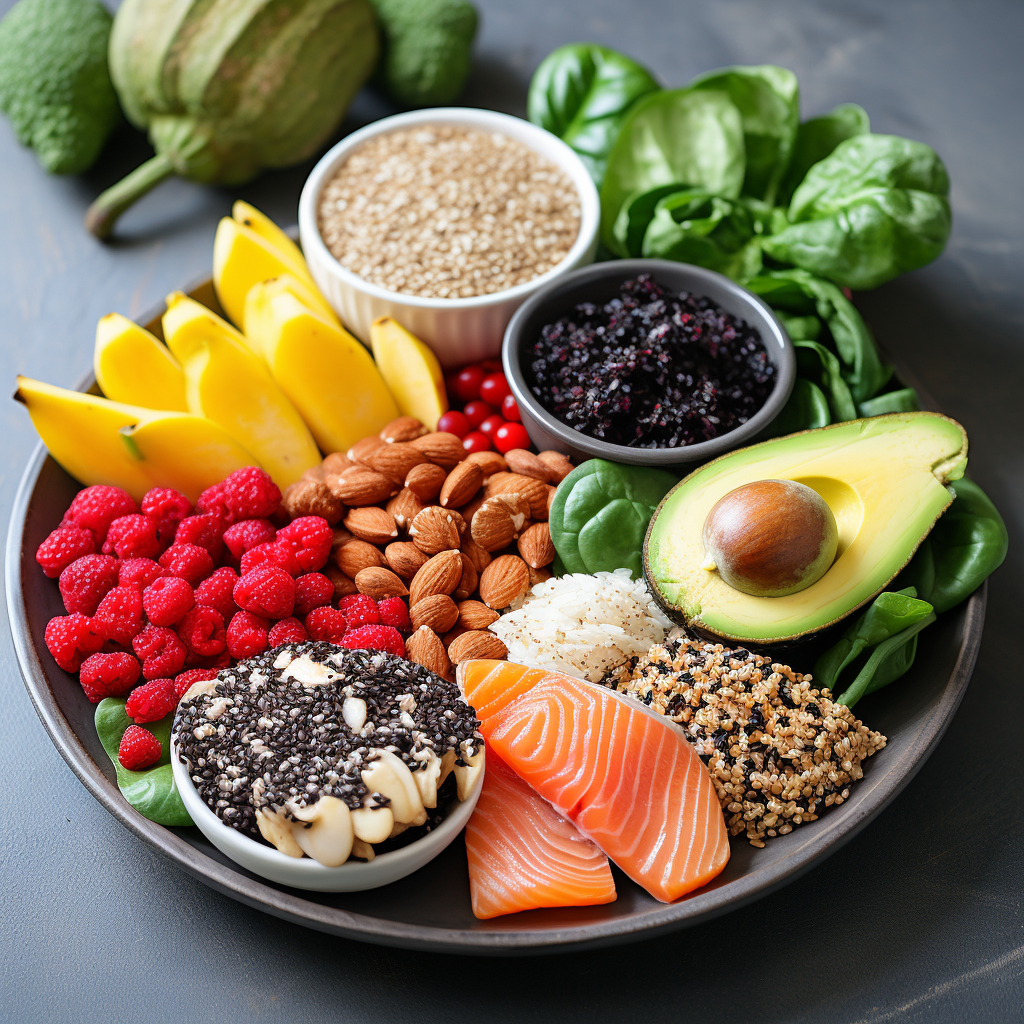
by Health And Healing AI | Mar 20, 2024 | Health, Healthy Recipes, Nutrition
Welcome to our exploration of vibrant well-being through the power of nourishing foods. Understanding where nutrients can be found is the first step in transforming your diet and, ultimately, your health. Nutrients are the building blocks of life, essential for the proper functioning of our bodies. They play a critical role in growth, healing, and maintaining a robust immune system. A nutrient-rich diet can help prevent chronic diseases, boost energy levels, and improve mental clarity.
Embarking on this wellness journey, it’s crucial to know that nutrients are abundant in various foods, each with its unique profile of vitamins, minerals, and other beneficial compounds. From leafy greens packed with vitamins A, C, and K to nuts and seeds rich in healthy fats and magnesium, understanding the diversity of nutrient sources is critical to a balanced diet.
Ready to kickstart your wellness journey? Sign up for our content to receive exclusive tips and updates. Take the first step towards a healthier, happier you! Join Our Community Today.
The Vital Vitamins and Where to Find Them

Vitamins are organic compounds that are imperative for our body to function correctly. They can be categorized into two groups: fat-soluble and water-soluble. Fat-soluble vitamins such as A, D, E, and K are stored in the body’s fatty tissue. In contrast, water-soluble vitamins like the B-complex and vitamin C must be replenished regularly as they are not stored in the body.
Finding these vitamins in food is not as daunting as it may seem. Vitamin A, for instance, is abundant in sweet potatoes, carrots, and dark leafy greens, which are excellent for eye health and immunity. The sunshine vitamin, Vitamin D, can be sourced from fatty fish like salmon, mackerel and fortified foods. Vitamin E, an antioxidant, can be found in nuts and seeds, while Vitamin K, essential for blood clotting, is rich in green leafy vegetables like kale and spinach.
When it comes to water-soluble vitamins, citrus fruits, strawberries, and bell peppers are excellent sources of Vitamin C, which is known for its immune-boosting properties. The B-complex vitamins, which include thiamine, riboflavin, niacin, and folate, can be found in whole grains, eggs, and legumes. These vitamins are crucial for energy production and maintaining proper nerve function.
Incorporating a variety of these vitamin-rich foods into your diet is beneficial for your health. It also adds color and diversity to your meals, making eating a delightful experience that nourishes both the body and the soul.
Minerals for Health: Identifying Food Sources

Much like vitamins, minerals are essential nutrients that play vital roles in maintaining bodily functions. Our bodies need inorganic elements to grow, develop, and stay healthy properly. Minerals such as calcium, magnesium, and potassium are vital for bone health, muscle function, and heart health.
Calcium, renowned for its importance in bone and teeth health, is predominantly found in dairy products like milk, cheese, and yogurt. However, for those who are lactose intolerant or follow a vegan diet, plant-based sources such as fortified plant milks, leafy greens, and almonds are also rich in calcium.
Magnesium is another mineral crucial for over 300 biochemical reactions in the body, including energy production and protein synthesis. Foods rich in magnesium include whole grains, nuts, seeds, and green leafy vegetables like spinach. It’s also present in lesser-known sources such as dark chocolate, providing an enjoyable way to meet your daily magnesium needs.
Potassium, vital for maintaining normal blood pressure and heart function, is abundant in bananas, oranges, potatoes, and tomatoes. Dietary guidelines often emphasize its role in counteracting the effects of sodium on blood pressure.
Other important minerals include iron, which is crucial for carrying oxygen in the blood and can be found in red meats and beans, and zinc, which is important for immune function and found in shellfish, seeds, and nuts. By consuming a diverse and balanced diet, you can ensure you get a wide range of minerals necessary for optimal health and well-being.
Plant-Based Nutrients and Their Superfood Sources

Transitioning to a plant-based diet does not mean compromising on the spectrum of essential nutrients. Nature’s Bounty offers a plethora of plant-based superfoods packed with vitamins, minerals, and antioxidants necessary for vibrant health. These foods are often high in fiber and phytonutrients, reducing the risk of chronic diseases.
Berries, such as blueberries, strawberries, and acai, are delicious and dense in nutrients and antioxidants. They are known to support heart health and provide a host of vitamins that promote skin health and immune function. Berries can be easily incorporated into your diet through smoothies, salads, or as a natural sweetener in oatmeal.
Leafy greens like kale, spinach, and Swiss chard are rich in iron, calcium, and a multitude of vitamins, including A, C, and K. These greens can form the base of salads, can be sautéed as a side dish, or blended into smoothies for a nutrient-packed meal.
Chia seeds and flaxseeds are known for their high omega-3 fatty acids, essential for brain health. They also contain significant fiber and protein, making them an excellent addition to breakfast bowls, baking, or as a thickener in vegan recipes.
Quinoa is a complete protein source, meaning it contains all nine essential amino acids, which is rare in the plant kingdom. It’s also a great source of magnesium and iron, making it a valuable ingredient for those following a plant-based diet.
By incorporating these and other plant-based superfoods into your diet, you’re nurturing your body with high-quality nutrients, supporting sustainable food practices, and contributing to overall planetary health.
Animal-Derived Nutrients and Optimal Food Choices
While plant-based diets are rich in numerous nutrients, certain animal-derived nutrients are pivotal for animal products. These nutrients often come in a form that the body can easily absorb and utilize, making animal products an efficient nutrient source for many.
Fatty fish, such as salmon, mackerel, and sardines, are excellent sources of omega-3 fatty acids, particularly EPA and DHA, which are known to support heart and brain health. They also provide a good dose of vitamin D, a nutrient that can be challenging to obtain in sufficient amounts from plant-based sources alone.
Eggs are often referred to as nature’s multivitamin due to their wide range of nutrients, including choline, which is essential for liver function and brain development, and lutein and zeaxanthin, which are beneficial for eye health. They are incredibly versatile and can be prepared in numerous ways to suit any meal.
Dairy products, like milk, cheese, and yogurt, are well-known for their calcium content, which is essential for bone health. They also provide protein, potassium, and vitamins B2 and B12. For those tolerating dairy, these foods can be a convenient part of a balanced diet.
When considering animal-derived nutrients, it’s essential to choose high-quality sources. Opting for grass-fed, organic, and sustainably sourced options can ensure the health benefits of these foods are maximized while also minimizing potential exposure to antibiotics and hormones often found in conventionally raised animals.
Understanding where nutrients can be found in plant-based and animal-derived foods allows for a well-rounded approach to diet and nutrition, catering to various dietary preferences and ensuring that all essential nutrients are adequately represented in one’s diet.
Balancing Macronutrients for Holistic Nutrition

Achieving a state of holistic nutrition involves more than focusing on vitamins and minerals; it requires a conscious effort to balance macronutrients—proteins, fats, and carbohydrates. Each plays a unique and vital role in supporting bodily functions and contributing to overall well-being.
Proteins are the body’s building blocks, essential for the growth and repair of tissues. They can be found in animal products, like meat and dairy, and plant-based sources, such as legumes and nuts.
Fats have been vilified, but they are crucial for hormone production, nutrient absorption, and providing an energy reserve. Healthy fats are abundant in avocados, nuts, seeds, and olive oil.
Carbohydrates are the body’s primary energy source, especially for the brain. Whole grains, fruits, and vegetables are excellent sources of carbohydrates, which also provide fiber and a plethora of other nutrients.
The key is to find the right balance that fuels your body while aligning with your lifestyle and health goals. This might mean adjusting macronutrient ratios to support athletic training, weight management, or managing health conditions.
Ready to kickstart your wellness journey? Sign up for our content to receive exclusive tips and updates. Take the first step towards a healthier, happier you! Join Our Community Today!
By understanding where nutrients can be found and how to balance them in your meals, you can empower yourself to make informed choices that nurture your body, mind, and spirit. Embrace the diversity of nutrients available across different food sources and enjoy the benefits of a balanced, nutrient-rich diet.

by Elizabeth Redd | Mar 19, 2024 | Health, Healthy Recipes, Nutrition
Welcome to a journey through the vibrant world of tomato nutrition, where each juicy bite is packed with a symphony of health benefits. Tomatoes, the versatile fruit that is a staple in cuisines worldwide, is not just a flavorful addition to meals but a powerhouse of nutrition. As we uncover what nutrition is in tomatoes, it’s evident that these red wonders are more than just a culinary delight.
Rich in vitamins, minerals, and antioxidants, tomatoes contribute significantly to a balanced diet. The presence of vitamin C, potassium, folate, and vitamin K in tomatoes supports various bodily functions from immune system defense to bone health. Moreover, the antioxidant lycopene, which gives tomatoes their signature red hue, is linked to a reduced risk of heart disease and certain cancers. But that’s just the beginning of the health secrets tomatoes hold.
Ready to kickstart your wellness journey? Sign up for our content to receive exclusive tips and updates. Take the first step towards a healthier, happier you! Join Our Community Today.
As we delve deeper into the nutritional profile of tomatoes, we’ll explore the myriad of ways this fruit can enhance your well-being. Whether eaten fresh, cooked, or as part of a sauce, the nutritional value of tomatoes remains a vital part of a health-conscious lifestyle. Let’s peel back the layers and discover the myriad of nutrients that make tomatoes an essential component of our daily diets.
The Vitamins and Minerals in Tomatoes

Diving into the heart of tomato nutrition, we find an impressive array of vitamins and minerals essential for optimal health. Tomatoes are an excellent source of vitamin C, a powerful antioxidant that plays a crucial role in immune function and skin health. Just one medium-sized tomato can provide about 28% of the recommended daily intake. They are also rich in potassium, a mineral that is vital for blood pressure control and cardiovascular health.
Furthermore, tomatoes offer a good dose of folate (vitamin B9), which is particularly important for pregnant women as it helps prevent neural tube defects in developing fetuses. They also supply a modest amount of vitamin K, essential for blood clotting and bone health. The presence of vitamin A in tomatoes, in the form of beta-carotene, supports vision and immune function.
In addition to these vitamins, tomatoes are a source of several trace minerals, including manganese and iron, which are important for various body processes, including metabolism and oxygen transport. The nutrient profile is rounded out by the presence of vitamin E, thiamine (B1), niacin (B3), and magnesium, contributing to the overall nutritional value of this humble fruit.
With this rich composition, it’s clear that incorporating tomatoes into your diet can be a simple yet effective way to ensure you’re receiving a broad spectrum of nutrients necessary for maintaining a healthy and energetic lifestyle.
Antioxidants Abound: Lycopene and Other Compounds

Tomatoes are a treasure trove of antioxidants, with lycopene being the standout compound. This powerful antioxidant gives tomatoes their characteristic red hue and is linked to a plethora of health benefits. Lycopene is known for its potential to reduce the risk of certain types of cancer, particularly prostate cancer, and has been studied for its role in heart health by possibly lowering the risk of cardiovascular disease.
But the antioxidant story doesn’t stop with lycopene. Tomatoes also contain flavonoids, such as quercetin and kaempferol, which have been researched for their anti-inflammatory properties and potential to combat oxidative stress in the body. Additionally, tomatoes are a source of vitamin C and vitamin E, both well-known antioxidants that work synergistically to enhance the body’s defense against free radicals.
The combination of these antioxidants in tomatoes can contribute to improved skin health by protecting against ultraviolet (UV) light damage, and they also play a role in long-term eye health by helping to prevent age-related macular degeneration and cataracts.
Regular consumption of tomatoes, whether fresh, cooked, or processed as tomato sauce, not only adds flavor to meals but also imbues your diet with these potent antioxidants, supporting overall health and wellness. It’s a compelling reason to make tomatoes a staple in your balanced diet.
Exploring the Caloric Content and Dietary Fiber

When examining what nutrition is in tomatoes, it’s important to understand their caloric content and the role of dietary fiber. Tomatoes are an excellent addition to a weight management diet due to their low-calorie profile. A medium-sized tomato typically contains only around 22 calories, making it an ideal food for those looking to maintain or reduce their calorie intake without sacrificing volume or nutrients.
Beyond the low caloric impact, tomatoes are rich in dietary fiber, which is essential for healthy digestion. The fiber in tomatoes helps to regulate the digestive system, aiding in the prevention of constipation and promoting regular bowel movements. Additionally, the presence of fiber contributes to a feeling of fullness, which can help curb appetite and prevent overeating.
The soluble and insoluble fibers present in tomatoes also play a role in cholesterol management. Soluble fiber has been shown to help lower total and LDL cholesterol levels, which are key factors in heart health. By incorporating tomatoes into your diet, you’re not only enjoying a delicious fruit but also taking advantage of its beneficial fiber content to support your digestive health and cardiovascular system.
How Tomato Nutrients Impact Overall Health
The array of nutrients found in tomatoes goes beyond just vitamins and minerals; these nutrients have a profound impact on overall health. Lycopene, the pigment that gives tomatoes their red color, is a powerful antioxidant. Studies suggest that lycopene may reduce the risk of certain types of cancer, particularly prostate cancer, and protect against heart diseases by preventing oxidative damage to lipids.
Tomatoes are also a source of vitamin C, which is vital for the immune system, skin health, and collagen production. Additionally, the potassium in tomatoes helps regulate blood pressure and fluid balance, while the vitamin K content is essential for blood clotting and bone health.
Another significant component is alpha-tomatine, a phytonutrient found in tomatoes that has been linked to anti-inflammatory effects and the potential to combat tumor growth. With these nutrients combined, the humble tomato offers protective benefits that extend to numerous body systems, showcasing how a diet rich in fruits and vegetables can be a cornerstone of preventive health care.
Integrating Tomatoes into Your Daily Diet

Integrating tomatoes into your daily diet can be a delightful and healthful experience. Fresh, sun-ripened tomatoes can enhance the flavor of salads, sandwiches, and wraps. Cooking tomatoes, such as in sauces, soups, and stews, not only intensifies their taste but also increases the availability of lycopene, making it easier for the body to absorb.
For those looking to get creative in the kitchen, tomatoes can be stuffed with grains or proteins, roasted to bring out their natural sweetness, or even incorporated into smoothies and juices for a refreshing nutrient boost. The versatility of tomatoes allows them to be a staple ingredient in a variety of cuisines, from Italian to Mexican, ensuring that adding them to your diet is both simple and enjoyable.
Remember, the key to reaping the full health benefits of tomatoes lies in consistent consumption as part of a balanced diet. Ready to kickstart your wellness journey? Sign up for our content to receive exclusive tips and updates. Take the first step towards a healthier, happier you! Join Our Community Today.

by Elizabeth Redd | Mar 2, 2024 | Health, Healthy Recipes, Nutrition
Welcome to the invigorating world of nutrition drinks, a realm where taste meets the pinnacle of health enrichment. In today’s fast-paced lifestyle, finding the right balance of nutrients can be a challenge, and that’s where these wholesome beverages come into play. Offering a convenient and delicious way to fuel your body, nutrition drinks have become a cornerstone for those seeking to enhance their well-being.
Whether you’re a fitness enthusiast, someone with specific dietary needs, or simply looking to improve your overall health, the quest to find ‘nutrition drinks near me’ can lead you to an array of local spots that specialize in these revitalizing elixirs. From organic juice bars to health food cafes, there are plentiful options to explore.
Ready to kickstart your wellness journey? Sign up for our content to receive exclusive tips and updates. Take the first step towards a healthier, happier you! Join Our Community Today.
As we delve deeper into the local landscapes that offer these nutrient-packed beverages, we aim to guide you through the top spots where you can find the perfect nutrition drink to complement your lifestyle. So, let’s raise a glass to your health and explore the best local venues that cater to your body’s needs.
Discovering Local Nutrition Drink Hotspots

Embarking on the journey to discover local nutrition drink hotspots can be both exciting and beneficial for your health. These hotspots are treasure troves of beverages crafted with vitamins, minerals, and other essential nutrients that support a balanced diet. To uncover these gems, consider starting with health-focused cafes and smoothie shops that are popping up in neighborhoods everywhere. These establishments often pride themselves on using fresh, high-quality ingredients to create drinks that are not only nutritious but also incredibly flavorful.
Another way to find nutrition-rich drinks is to frequent local farmers’ markets or organic grocery stores. Many vendors offer freshly squeezed juices or homemade concoctions that prioritize natural and organic produce. For those with specific health goals or dietary restrictions, specialized nutrition shops and wellness centers can provide tailored options, including meal replacement shakes, protein-packed smoothies, and detox juices, ensuring that you find the perfect drink to fit your individual needs.
Exploring these local nutrition drink hotspots not only supports your physical health but also promotes local businesses and sustainable practices. By choosing to patronize these establishments, you’re making a positive impact on your community while nurturing your body with the best nutrition available.
The Health Benefits of Nutrient-Rich Beverages

Nutrient-rich beverages are more than just a trend; they are a cornerstone in the pursuit of a healthy lifestyle. Consuming drinks that are densely packed with vitamins, minerals, and antioxidants can have profound effects on your overall health. These beverages, including smoothies, green juices, and fortified drinks, can contribute to improved digestion, enhanced immune function, and increased energy levels. By incorporating a variety of fruits, vegetables, and supplements, these drinks ensure that your body receives a broad spectrum of nutrients necessary for optimal function.
For those looking to manage their weight, nutrition drinks can serve as a nutritious snack or meal replacement, helping to curb hunger and provide essential nutrients without excessive calories. They can also play a crucial role in post-workout recovery, delivering protein and carbohydrates that aid in muscle repair and replenishment of glycogen stores. Moreover, certain nutrient-enriched drinks are designed to support heart health, with ingredients known to lower blood pressure and improve cholesterol levels.
It’s important to recognize that not all nutrition drinks are created equal. To fully reap the health benefits, it’s essential to choose beverages that are low in added sugars and free from artificial additives. By prioritizing quality and whole-food ingredients, you can enjoy delicious drinks that contribute positively to your health and well-being.
Navigating Nutrition Drinks for Special Diets

Finding nutrition drinks near me that align with special dietary requirements can be a significant concern for those with specific health needs or preferences. Whether you’re adhering to a vegan, gluten-free, keto, or low-FODMAP diet, there are options available that cater to these unique nutritional profiles. When seeking out beverages, it’s crucial to scrutinize ingredient lists for potential allergens or non-compliant components that could disrupt your diet.
For individuals on a plant-based diet, vegan-friendly drinks that utilize pea protein, hemp, or brown rice as their protein source are excellent choices. These are not only compatible with a vegan lifestyle but are also generally easier to digest and can be beneficial for those with dairy intolerances. Similarly, people with celiac disease or gluten sensitivity should opt for nutrition drinks that boast a gluten-free label, ensuring the absence of wheat, barley, or rye derivatives.
Those following a ketogenic diet must seek out drinks with high fat and low carbohydrate content, avoiding sugar-laden options that could impede ketosis. On the other hand, low-FODMAP individuals need to avoid drinks with certain sweeteners and fibers that can exacerbate gastrointestinal issues. It’s always recommended to consult with a healthcare professional or registered dietitian to help navigate the best nutrition drink choices for your specific dietary needs, ensuring that you maintain both the integrity of your diet and your health.
The Rise of Organic and Plant-Based Drink Options

The health-conscious consumer’s demand for clean and sustainable products has given rise to a burgeoning market of organic and plant-based drink options. These beverages cater not only to those looking for nutrition drinks near me but also to anyone aspiring to a more natural and environmentally friendly lifestyle. Organic drinks are made from ingredients cultivated without synthetic pesticides or fertilizers, offering a purer taste and the peace of mind that comes with reduced exposure to potentially harmful chemicals.
Plant-based drinks, on the other hand, have soared in popularity due to their ethical, environmental, and health benefits. Ranging from almond and soy to oat and coconut, these dairy alternatives have become staples in coffee shops and supermarkets alike. They not only serve vegans and those with lactose intolerance but also appeal to a broader audience that is choosing plant-based products for their lower carbon footprint and potential health advantages.
Moreover, many of these organic and plant-based beverages are fortified with vitamins and minerals, making them nutritionally comparable to their conventional counterparts. With a growing awareness of the impacts of diet on health and the environment, these drink options are becoming an integral part of a balanced, responsible diet. As consumers become more informed and selective, the trend toward organic and plant-based nutrition drinks is expected to continue its upward trajectory.
Crafting the Perfect Nutrition Drink Experience
Embarking on the quest for the perfect nutrition drink experience involves more than just picking a beverage off the shelf. It’s about discovering flavors and ingredients that not only satiate your taste buds but also contribute to your overall well-being. Creating the ideal nutrition drink is an art that combines taste, health benefits, and individual dietary needs into a harmonious symphony of refreshment.
Begin by considering your personal health goals. Are you looking for a post-workout recovery aid, a meal replacement, or a daily wellness booster? Once you’ve identified your objectives, seek out drinks with high-quality proteins, essential vitamins, and minerals, and be mindful of sugar content. For those with specific dietary restrictions, the market offers a wealth of options, including gluten-free, keto-friendly, and vegan nutrition drink choices.
Don’t forget the role of locality and freshness. A ‘nutrition drinks near me’ search can lead you to local health food stores and farmer’s markets, where freshly made juices and smoothies, packed with local and organic ingredients, are often available. By supporting these local businesses, you’re not only getting a fresher product but also contributing to the local economy and reducing your carbon footprint.
Ready to kickstart your wellness journey? Sign up for our content to receive exclusive tips and updates. Take the first step towards a healthier, happier you! Join Our Community Today.!

by Elizabeth Redd | Mar 1, 2024 | Health, Healthy Recipes, Nutrition
Welcome to the journey of uncovering what nutrition is in potatoes. These earthy treasures are more than just comfort food; they are packed with an array of nutrients that are vital for maintaining good health. As we delve into the various components that make up the nutritional profile of potatoes, we’ll also explore the surprising health benefits they offer. Potatoes are not just a staple carbohydrate; they are a source of vitamins, minerals, and dietary fiber that can contribute to your overall wellness.
Whether you love them baked, boiled, or mashed, understanding the nutritional makeup of potatoes can help you make informed decisions about how they fit into a balanced diet. So, let’s embark on this educational foray into the world of potato nutrition and discover how this humble tuber can play a role in a health-conscious lifestyle.
Ready to kickstart your wellness journey? Sign up for our content to receive exclusive tips and updates. Take the first step towards a healthier, happier you! Join Our Community Today.!
Exploring the Vitamins and Minerals in Potatoes

Digging deeper into the nutritional content of potatoes, one finds an impressive array of vitamins and minerals essential for the body’s various functions. Potatoes are a notable source of vitamin C, which is not only a powerful antioxidant but also plays a crucial role in immune system support, skin health, and iron absorption. They also provide significant amounts of vitamin B6, which is vital for healthy brain development and function, as well as for maintaining a robust nervous system.
On the mineral front, potatoes boast a high potassium content, which is key for maintaining normal blood pressure and heart function. They also contain magnesium and iron, minerals that are indispensable for energy production and oxygen transport, respectively. Additionally, potatoes are a source of zinc, which is necessary for immune function and wound healing, and phosphorus, which is important for the formation of bones and teeth.
It is important to note that the nutritional value can vary depending on the type of potato and the preparation methods. For example, consuming potatoes with their skin on increases the intake of dietary fiber and nutrients, as many vitamins and minerals are contained just beneath the skin. Incorporating potatoes into a balanced diet can help ensure that you are getting a broad spectrum of the nutrients your body needs to thrive.
The Role of Antioxidants and Phytonutrients in Potatoes

Beyond their vitamins and minerals, potatoes are also packed with antioxidants and phytonutrients, compounds that play a significant role in protecting the body against disease. These bioactive components can neutralize harmful free radicals, which are unstable molecules that can cause oxidative stress and damage to cells. Oxidative stress is associated with various chronic diseases, including heart disease, cancer, and diabetes.
Potatoes contain flavonoids, carotenoids, and phenolic acids – all types of antioxidants. Notably, the purple and red varieties of potatoes have high levels of anthocyanins, which have been shown to have strong antioxidant properties. Additionally, potatoes are a source of a phytonutrient known as chlorogenic acid, which is one of the most abundant polyphenols in the diet and has been linked to reducing the risk of cardiovascular diseases.
The inclusion of potatoes in your diet contributes to an increased intake of these beneficial compounds. However, it’s worth noting that the way potatoes are cooked can affect their phytonutrient content. For example, frying potatoes can significantly reduce the levels of antioxidants compared to boiling or steaming. To maximize the health benefits, it is advised to prepare potatoes in ways that maintain their nutrient integrity.
Understanding the Carbohydrates and Fiber Content

Potatoes are often recognized for their carbohydrate content, which serves as a primary energy source for the body. The carbohydrates in potatoes are mostly in the form of starch, with a small portion made up of simple sugars such as glucose, fructose, and sucrose. While carbohydrates are essential for energy, it’s important to consider the type and quality of carbohydrates consumed.
Potatoes also offer dietary fiber, especially when the skins are consumed. Fiber is a crucial component for digestive health, aiding in bowel regularity and fostering a healthy gut microbiome. It has additional health benefits, such as helping to regulate blood sugar levels and contributing to a feeling of fullness, which can support weight management efforts. A medium-sized potato with skin provides about 4 grams of fiber, which is 16% of the recommended daily intake.
Interestingly, potatoes contain resistant starch, especially when cooked and then cooled. Resistant starch is not digested in the small intestine but instead ferments in the large intestine, acting similarly to dietary fiber. This has been linked to several health benefits, including improved insulin sensitivity, lower blood sugar levels, and increased satiety. To make the most of this benefit, one could include cold potatoes in salads or enjoy them as part of a meal that has been prepared in advance.
Protein and Amino Acids Profile of Potatoes
While potatoes are not typically hailed as a high-protein food, they do contain a modest amount of protein that can contribute to one’s daily intake. A medium-sized potato offers approximately 3 grams of protein, which is about 6% of the daily value for the average adult. This protein is packed with various amino acids, which are the building blocks of proteins in our bodies.
Potatoes contain a spectrum of amino acids, including essential ones that the body cannot synthesize and must obtain from the diet. Notably, potatoes are a good source of the amino acid lysine, which is often lacking in grain-based diets. Lysine is vital for proper growth, tissue repair, and the production of hormones, enzymes, and antibodies.
It’s also worth mentioning that the protein quality in potatoes is generally high, meaning their protein is well-utilized by the human body. This is particularly beneficial for those who rely on plant-based sources for their protein needs. Combining potatoes with other protein sources, such as legumes, can provide a complete protein profile, ensuring that all essential amino acids are present in adequate amounts for the body’s requirements.
Incorporating potatoes into a balanced diet can thus support not only energy needs but also contribute to muscle maintenance and overall body function thanks to its protein and amino acids content.
Debunking Myths: The Truth About Potatoes and Weight Management

Debunking myths surrounding potatoes and weight management is essential in understanding their role in a healthy diet. Contrary to popular belief, potatoes in their whole, unprocessed form are not inherently fattening. In fact, they can be part of an effective weight management plan due to their high satiety index, which helps people feel full longer and may reduce overall calorie intake.
Potatoes are rich in dietary fiber, especially when consumed with their skin. Fiber aids in digestion and can help prevent overeating by promoting a feeling of fullness. Additionally, the resistant starch found in cooled cooked potatoes acts as a prebiotic, nourishing beneficial gut bacteria which is linked to improved metabolism and weight control.
However, it’s important to consider the method of preparation and serving size when including potatoes in a weight management plan. Opting for baking, boiling, or steaming rather than frying, and being mindful of added high-calorie toppings like butter, sour cream, or cheese, can allow one to enjoy potatoes without compromising their weight goals.
Understanding the nutritional profile of potatoes and recognizing the impact of cooking methods on caloric content empower individuals to make informed decisions about including this versatile vegetable in their diet. Ready to kickstart your wellness journey? Sign up for our content to receive exclusive tips and updates. Take the first step towards a healthier, happier you! Join Our Community Today.

by Elizabeth Redd | Feb 26, 2024 | Health, Healthy Recipes, Nutrition
Welcome to a journey through the nutritional landscape of one of nature’s most versatile foods: the egg. Eggs are a powerhouse of essential nutrients, making them a valuable addition to a balanced diet. Rich in high-quality protein, vitamins, and minerals, eggs provide a symphony of health benefits that can contribute significantly to your well-being. Whether you’re an athlete looking for muscle repair, a student in need of brain food, or anyone in between striving for optimal health, the nutrition value of eggs is unparalleled.
From the essential amino acids to the eye-protecting antioxidants, eggs pack a punch in a small package. Their adaptability in the kitchen makes them an easy ingredient to incorporate into any meal, providing a delicious and nutritious boost to your day. With the latest research in hand, we will explore how the humble egg can be a cornerstone of a healthful diet and why it deserves a spot on your plate.
Ready to kickstart your wellness journey? Sign up for our content to receive exclusive tips and updates. Take the first step towards a healthier, happier you! Join Our Community Today.!
Eggs: A Complete Protein Source Unveiled
Eggs have long been celebrated as a complete protein source, an accolade that stems from their full profile of nine essential amino acids. These amino acids cannot be synthesized by the body and therefore must be ingested through diet. The protein in eggs is highly bioavailable, meaning it is easily absorbed and utilized by the body, which is crucial for muscle repair, immune function, and overall growth and maintenance of the body.
In addition to their impressive amino acid profile, the quality of the protein found in eggs is second to none. The ‘biological value’—a measure of protein quality that assesses how well the body can use a protein—is exceptionally high for eggs. This makes them an ideal food choice not only for athletes who require efficient protein synthesis for muscle recovery but also for anyone interested in maintaining muscle mass, such as the elderly.
One large egg contains about 6 to 7 grams of protein, which can significantly contribute to the daily protein requirements of an individual. The versatility of eggs, from boiled and poached to scrambled and baked, allows this protein-rich food to be easily incorporated into various meals, ensuring that the nutrition value of eggs can be enjoyed throughout the day.
Vitamins and Minerals in Eggs: A Spectrum of Benefits

Beyond their protein prowess, eggs are a treasure trove of vitamins and minerals essential for a myriad of bodily functions. Each egg is packed with a spectrum of vitamins, including Vitamin A, which is vital for eye health and immune function, Vitamin B12 and riboflavin for energy metabolism, and Vitamin D, which is relatively rare in natural food sources and crucial for bone health and immune function.
The mineral content of eggs further amplifies their nutritional profile. They are a good source of iodine, necessary for thyroid function, and selenium, an antioxidant that helps protect cells from damage. Eggs also contain zinc, which is important for skin health, immune function, and DNA synthesis. Moreover, they are one of the few food sources that naturally contain choline, a nutrient that supports brain development and liver function.
It’s important to note that the majority of these nutrients are found in the egg yolk. While egg whites hold their own as a protein source, the yolk is where the nutrition value of eggs truly shines. Including the egg yolk in your diet ensures you gain the full range of benefits from this nutrient-dense food. Given the richness of nutrients found in eggs, incorporating them into your diet can play a supportive role in achieving a balanced and healthful eating pattern.
Understanding the Fat and Cholesterol Debate in Eggs

The discussion surrounding the fat and cholesterol content in eggs has been a topic of much debate among health professionals and nutritionists. Eggs have been scrutinized in the past due to their cholesterol content; however, recent research indicates that the cholesterol found in eggs has a minimal impact on blood cholesterol levels for most people.
Eggs contain both saturated and unsaturated fats, which are important for hormone production and nutrient absorption. The saturated fat in eggs is lower compared to many other animal products, and it’s the unsaturated fats in eggs, such as omega-3 fatty acids, that are beneficial for heart health.
It’s also essential to understand the difference between dietary cholesterol and blood cholesterol. While eggs are high in dietary cholesterol, they do not significantly raise blood cholesterol levels in the majority of individuals. In fact, the body regulates its own cholesterol production in response to dietary intake, and for many, eating eggs may not lead to an increase in blood cholesterol. However, individuals with certain genetic conditions or a history of heart disease should consult with a healthcare provider to determine their optimal dietary intake of cholesterol.
Moreover, the nutrition value of eggs should not be overlooked due to the fat and cholesterol content. When consumed as part of a balanced diet, eggs can contribute positively to overall health. The key is moderation and understanding how eggs fit into one’s individual nutritional needs.
Eggs in Your Diet: Safe Consumption Tips

Incorporating eggs into your daily diet can be done safely with a few mindful practices. First and foremost, it is critical to choose eggs that come from a reputable source. Opt for eggs that are certified organic or free-range, ensuring they come from chickens that have been raised in better conditions, which can affect the nutrition value of eggs.
When it comes to preparing eggs, it’s important to cook them thoroughly to avoid the risk of foodborne illnesses such as salmonella. Eggs should be cooked until both the yolk and white are firm, and dishes containing eggs should be cooked to an internal temperature of 160°F to ensure safety.
If you enjoy eggs but are concerned about cholesterol intake, consider using only the egg whites, which contain no cholesterol and are lower in calories while still providing high-quality protein. Additionally, be mindful of what you pair with eggs. For a balanced meal, include vegetables and whole grains, rather than high-fat, processed accompaniments.
Lastly, remember that moderation is key in any healthy diet. While eggs are a nutritious choice, it is beneficial to consume them alongside a variety of other protein sources to ensure a well-rounded intake of nutrients.
Egg-cellent Recipes: Wholesome Ways to Enjoy Eggs

Embarking on a journey towards better health can be both exciting and delicious, especially with eggs as a versatile ingredient in your culinary arsenal. To get started, sign up for our content at Health and Healing AI and join our community today!
One of the simplest yet most nutritious ways to enjoy eggs is by preparing a vegetable omelet. Sauté your favorite vegetables like spinach, tomatoes, and onions, then pour beaten eggs over the top and cook until set. This meal is not only rich in nutrition value of eggs, but also packed with fiber and vitamins from the vegetables.
For those on-the-go, hard-boiled eggs make a great portable snack. Boil a batch at the beginning of the week and you’ll have a ready-to-eat protein source at your fingertips. Couple them with whole grain crackers and a piece of fruit for a balanced mini-meal.
Another wholesome recipe is a quinoa and egg breakfast bowl. Start with a base of cooked quinoa, top with a poached egg, and add a handful of greens like kale or arugula. Drizzle with olive oil and sprinkle with seeds or nuts for added texture and nutrients.
Eggs can also be baked into frittatas with low-fat cheese, lean meats, and plenty of vegetables. This dish can serve as a hearty breakfast or a light dinner, offering a satisfying balance of macronutrients and the full spectrum of amino acids from the eggs.
Ready to kickstart your wellness journey? Join Our Community Today and receive exclusive tips and updates. Take the first step towards a healthier, happier you!

by Elizabeth Redd | Feb 23, 2024 | Health, Healthy Recipes, Nutrition
Welcome to the fascinating world of nutritional yeast, a powerhouse of flavor and health benefits that has captured the hearts of health enthusiasts and culinary experts alike. Often referred to by its affectionate nickname ‘nooch’, this versatile ingredient is celebrated for its savory, cheesy flavor and its impressive nutritional profile. But what is nutritional yeast used for? Let’s delve into the myriad ways this wonderful ingredient can enhance your diet and overall well-being.
From its origins as a staple in vegan cooking to its growing popularity among various dietary preferences, nutritional yeast is used to add a nutritious boost to a multitude of dishes. Whether it’s sprinkled over popcorn for a guilt-free snack, blended into creamy sauces to create a dairy-free alternative, or used as a seasoning to elevate the taste of salads and soups, nutritional yeast’s uses are as diverse as they are delicious.
Ready to kickstart your wellness journey? Sign up for our content at Health And Healing AI to receive exclusive tips and updates. Take the first step towards a healthier, happier you! Join Our Community Today.
Nutritional Profile of Nutritional Yeast

Understanding the nutritional profile of nutritional yeast reveals why it’s such a treasured supplement in many diets. This deactivated yeast, usually derived from Saccharomyces cerevisiae, is a powerhouse of essential nutrients. It’s particularly renowned for its high levels of B vitamins, including B12, which is often a concern for those following a plant-based diet. In fact, one tablespoon of fortified nutritional yeast can provide the full daily recommended amount of B12.
The benefits extend beyond B vitamins. Nutritional yeast is a complete protein, containing all nine essential amino acids that the body cannot synthesize on its own. It’s also rich in dietary fiber, which promotes digestive health, and contains minerals such as zinc, selenium, manganese, and molybdenum, all crucial for various bodily functions.
Another significant component is beta-glucans, a form of soluble fiber known for its role in improving cholesterol levels and boosting heart health. Furthermore, nutritional yeast is naturally low in fat and sodium, making it an excellent addition to a health-conscious diet. With such an impressive nutritional lineup, it’s easy to see why nutritional yeast has become a cornerstone for those seeking to enrich their diet with wholesome, nourishing ingredients.
Culinary Creations with Nutritional Yeast
The versatility of nutritional yeast in the kitchen is boundless, sparking creativity among chefs and home cooks alike. Its cheesy, nutty flavor makes it a popular cheese substitute, particularly in vegan and dairy-free recipes. When sprinkled over popcorn or stirred into mashed potatoes, it adds a savory depth that enhances the dish’s overall taste profile.
Another way what is nutritional yeast used for is its role in thickening sauces and dressings, where it provides a creamy texture without the need for actual cream. For those who adore a flavorful crust, nutritional yeast can be mixed into breadcrumbs for a nutrient-packed topping on casseroles or as a coating for tofu, tempeh, and even meat substitutes.
Nutritional yeast is also a key ingredient in homemade pesto, where it stands in for Parmesan, offering a similar umami experience. Its application extends to soups, gravies, and stews, where a tablespoon can enrich the broth, lending a complex flavor that’s hard to achieve with other single ingredients. This culinary chameleon can effortlessly adapt to a multitude of recipes, proving that it’s not just a health food but a genuine staple in modern cooking.
Health Benefits of Incorporating Nutritional Yeast

The health benefits of incorporating nutritional yeast into one’s diet are impressive, making it more than just a flavorful addition to meals. This powerhouse supplement is a rich source of B-vitamins, particularly B12, which is essential for nerve function and the production of DNA and red blood cells. It’s especially valuable for vegans and vegetarians who may struggle to obtain enough B12 from plant-based sources alone.
Nutritional yeast is also a complete protein, containing all nine essential amino acids that the human body cannot produce independently. This makes it an important protein source for those on plant-based diets. Its high fiber content aids digestion and can help regulate blood sugar levels, providing a sense of fullness and reducing cravings.
Another significant benefit is its content of beta-glucans, a type of fiber known for its immune-modulating effects. These compounds can help strengthen the immune system and even lower bad cholesterol levels. Furthermore, the antioxidants present in nutritional yeast, such as glutathione and selenomethionine, help protect cells from oxidative damage, which is linked to chronic diseases and aging.
With what is nutritional yeast used for extending beyond taste to health, it’s clear that this nutritional adjunct is not only versatile in the culinary world but also offers a plethora of health advantages. As research continues to shed light on its benefits, nutritional yeast is fast becoming a staple for those seeking to enrich their diet with beneficial nutrients.
Tips for Storing and Using Nutritional Yeast

To maximize the lifespan and preserve the flavor of nutritional yeast, proper storage is key. Ideally, it should be kept in a cool, dark place to prevent the degradation of its vitamins. An airtight container is crucial to prevent moisture, which can lead to spoilage. Many prefer to store nutritional yeast in the refrigerator or freezer, which can significantly extend its shelf life while maintaining its nutritional value.
When it comes to using nutritional yeast, the possibilities are broad and exciting. It can be sprinkled over popcorn for a cheesy flavor without the dairy, added to soups and stews for umami depth, or mixed into sauces and dressings for added richness. Nutritional yeast also makes a great thickener for sauces and can be used as a cheese substitute in vegan recipes, such as cashew cheese or ‘nooch’ sauce.
For those new to what is nutritional yeast used for, starting with a small amount is advisable as its flavor is robust and distinct. Gradually increase the quantity used to suit personal taste preferences. Additionally, because of its high vitamin content, particularly B-vitamins, it’s important not to overconsume nutritional yeast as it could lead to an excessive intake of certain nutrients.
Whether you’re a seasoned nutritional yeast aficionado or a curious newcomer, these storage and usage tips will ensure you get the most out of this versatile ingredient, enhancing your dishes with both flavor and nutrition.
Innovative Recipes Featuring Nutritional Yeast

Embracing the versatility of nutritional yeast extends into a realm of innovative recipes that can transform your meals into nutrient-packed delights. For the adventurous foodie, a ‘cheesy’ kale chip recipe can be the perfect introduction to the wonders of nutritional yeast. By tossing fresh kale in a mix of olive oil, nutritional yeast, and your choice of spices before baking, you create a crunchy, nutritious snack.
Another creative use is incorporating nutritional yeast into a vegan Alfredo sauce. Blend soaked cashews with garlic, lemon juice, nutritional yeast, and plant-based milk to achieve a creamy and savory sauce that rivals its dairy counterpart. This can be tossed with pasta or drizzled over roasted vegetables for a comforting meal.
For breakfast enthusiasts, nutritional yeast can be a game-changer in tofu scrambles. By adding it to crumbled tofu with turmeric, onion, and bell peppers, you can create a delicious and high-protein vegan scramble that mimics scrambled eggs in both taste and appearance.
Nutritional yeast’s nutty and cheesy flavor also makes it a prime candidate for homemade vegan pesto. Blend it with basil, garlic, pine nuts, and olive oil for a dairy-free pesto that’s perfect for pastas, sandwiches, and more.
Ready to kickstart your wellness journey? Sign up for our content to receive exclusive tips and updates. Take the first step towards a healthier, happier you! Join Our Community Today.
These innovative recipes are just the beginning of what you can create with nutritional yeast. With each new dish, you’ll unlock more of its potential, making it a staple in your pantry for health-conscious and flavorful cooking.

























